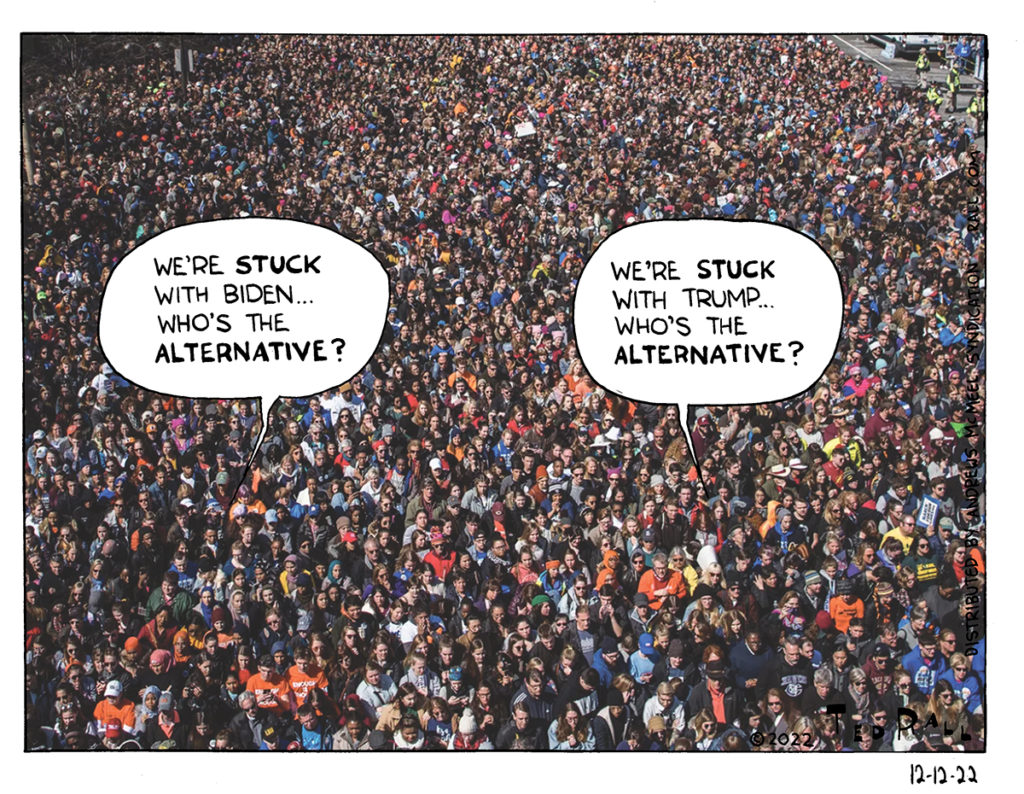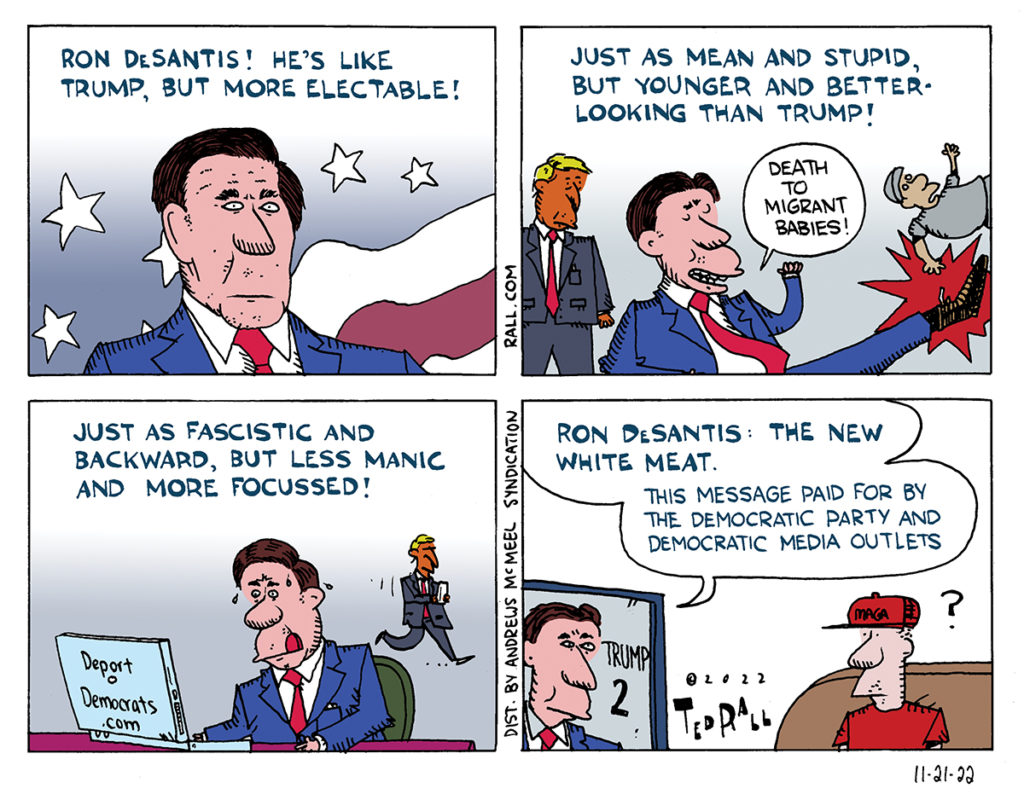In an age where political partisans pick and choose their own facts, we need a defender of reality who forces Republicans and Democrats alike to face up to the harsh truth.
Best System Ever except for the Way It Actually Works
Because the Democratic Party hasn’t built a farm team, they may well be stuck with 82-year-old Joe Biden to run for reelection. Republicans, meanwhile, are in an analogous situation, possibly stuck with Donald Trump because no better alternative has stepped up yet. How did the population of 330 million people end up with so few choices?
DMZ America Podcast #75: Trump Runs Again. NATO Almost Starts WW3. What Should the 2024 Campaign Be About?
Donald Trump is running a third time. Editorial cartoonists Ted Rall and Scott Stantis discuss his prospects and possible challengers, as well as the media’s attempt to pretend he doesn’t exist. A stray Ukrainian missile kills two people in Poland, Poland blames Russia and NATO almost goes to war with Russia over the mistake. Did Russia have a point about an intertwined military alliance along its border? Finally, a contrast between what the 2024 campaign will look like and what, in a saner country with a functional political climate, it should be about.
Like Going after Al Capone for Taxes
Former President Donald Trump faces legal and political jeopardy on many fronts. He is arguably guilty of treason for attempting to conspire to overthrow the government on January 6, 2021. As a real estate developer in New York, he engaged in shady tax filings. There have been allegations of fraud. He hobnobs with political extremists. Given all this, it seems strange that what we are talking about, and what the FBI and the Department of Justice are going after him about, is the relatively minor issue of documents that he took out of the White House without permission.
Trump’s Critics Are Even More Dangerous Than He Is

Edward Luce of the Financial Times recently tweeted one of the most overheated sentences ever uttered in the world of politics: “I’ve covered extremism and violent ideologies around the world over my career. Have never come across a political force more nihilistic, dangerous & contemptible than today’s Republicans. Nothing close.” General Michael Hayden, former director of the CIA and NSA, added: “I agree.” These opinions, and the fact that they are quoted approvingly by Margaret Sullivan in her final column as a media writer for The Washington Post, indicate that Trump Derangement Syndrome is raging at a 106° fever pitch among Democratic elites.
Luce’s remark is pure madness. No one will out-disdain me when it comes to the GOP but only a lunatic would argue they’re more “nihilistic, dangerous and contemptible” than the Khmer Rouge, the Rwandan Hutu-led government of Théoneste Bagosora, Al Qaeda, ISIS or Saudi Arabia. It’s depressingly revealing to watch that someone who so clearly ought to and probably does know better like Sullivan, who earned praise for her courageous run as ombudsman at The New York Times, regurgitate such ahistorical nonsense and turn to a man like Hayden—who for years presided over the exquisitely illegal effort to collect and store every communication between every individual and organization on Earth—for his opinions on democracy.
(Disclosure: After some initially-promising email exchanges about the possibility that she and the Post might look into the Los Angeles Times’ decision to fire and smear me as a favor to the LAPD, Sullivan ghosted me.)
There is nothing wrong with sounding the alarm about Donald Trump. But democratic institutions face a far bigger threat than the former and possibly future president: the argument, repeated incessantly across multiple platforms by boldfaced media and political personalities, that Trump is especially dangerous, that he lied/lies more than other politicians, that his politics are exceptionally extreme…that he is somehow unique.
The standard argument that, as Post columnist Jennifer Rubin put it in her 2017 screed, that “[Trump] is Not a Normal President,” invites the American public to buy into three assumptions:
- Other presidents and politicians tell fewer lies—a lot fewer—than Trump.
- Nothing was fundamentally wrong with the United States or its political system before Trump came along.
- Get rid of Trump and everything will be fine.
Certainly, Trump and his presidency were unusual in some respects. He’s the only man to have won the White House without having held political office or served in the military. He eschewed prepared speeches. His campaign ran on a shoestring budget without a national organization. He expressed the willingness to talk to enemies and adversaries without preconditions. He continued to hold campaign rallies during his presidency. But the media hype is a lie. In the ways that matter most in a presidency—policy and tone—Donald Trump was/is anything but anomalous.
Yes, Trump refused to concede the 2020 election. George W. Bush refused to concede the 2000 election.
Trump’s goons resorted to violence to try to overturn an election. So did Bush’s.
Trump tried to steal an election. Bush succeeded.
Trump wallowed in racist dog whistles. So did Ronald Reagan and George H.W. Bush.
Trump’s cabinet was full of underqualified nuts. So was Reagan’s and Bush’s.
The first step is admitting that you have a problem. American democracy has big problems. But neither the media nor the political class nor the voters are willing to acknowledge them—so there’s no chance we’ll fix them.
Not only are we in denial about the systematic flaws baked into our political system—two parties that conspire to keep smaller parties off the ballot, the inherently corrupting influence of capitalism on democracy, the electoral college and the revolving door between business, media and politics—we’re deluding ourselves into believing that Donald Trump is the problem.
Trump isn’t the problem. He’s a symptom.
The duopoly gave us Trump when the DNC kneecapped his strongest Democratic primary challenger, Bernie Sanders, in favor of Hillary Clinton. The cult of money convinced voters that his wealth qualified him for office. The electoral college gave him the White House even though he got fewer votes.
Those who obsess over Trump are far more dangerous than he is. Trump is old and fat and, before long, will no longer be with us. The issues we’re ignoring while we’re distracted by Trump will afflict us for years to come.
As will the idiots who won’t shut up about Trump.
(Ted Rall (Twitter: @tedrall), the political cartoonist, columnist and graphic novelist, co-hosts the left-vs-right DMZ America podcast with fellow cartoonist Scott Stantis. You can support Ted’s hard-hitting political cartoons and columns and see his work first by sponsoring his work on Patreon.
Who Can Tell the Difference?
Democrats complain, correctly, that Republicans are trying to subvert democracy with voter suppression and other tactics. But what democracy are they trying to subvert? Both parties are far more similar than anyone would like to admit, meaning that there isn’t really a true choice at the ballot box in the first place.
The Democracy We Deserve
A lot can and will change between now and 2024, but currently the frontrunners for the Democratic and Republican nominations are the same exact septuagenarians who ran last time. And one of them is about to become an octogenarian. Whatever else the United States is, it’s not a great example for the rest of the world. Either, or both of these guys, could easily die on the campaign trail.
Great Replacement
“The great replacement theory” is a conspiracy theory that looks at the shrinking proportion of white Americans and explains it as the result of a left-leaning plot to replace whites with people of color who are more likely to vote to the left. It has gained mainstream currency within the Republican Party and on Fox News.








